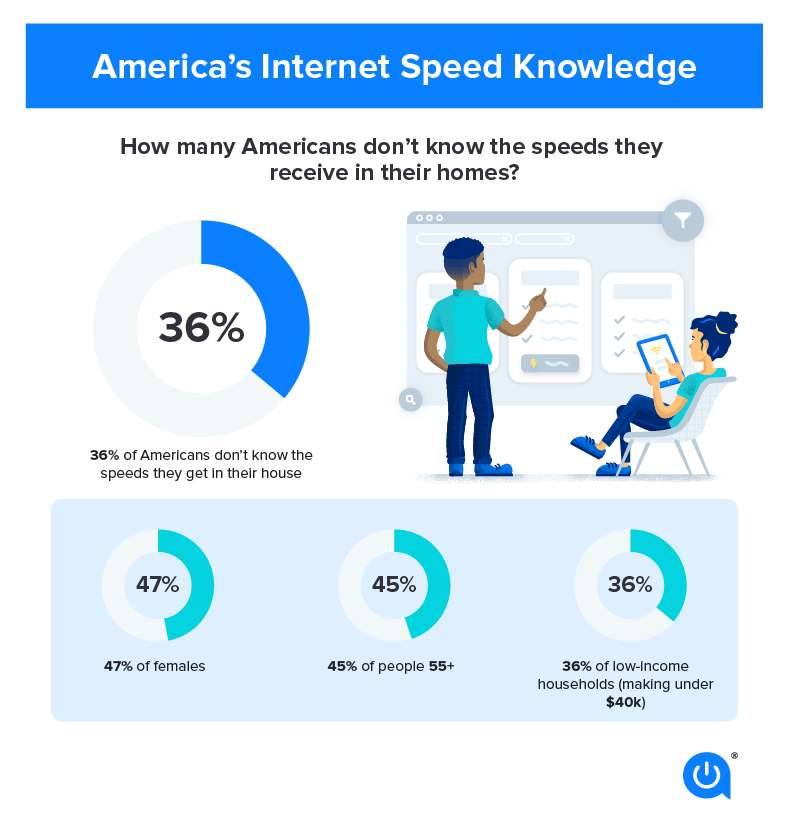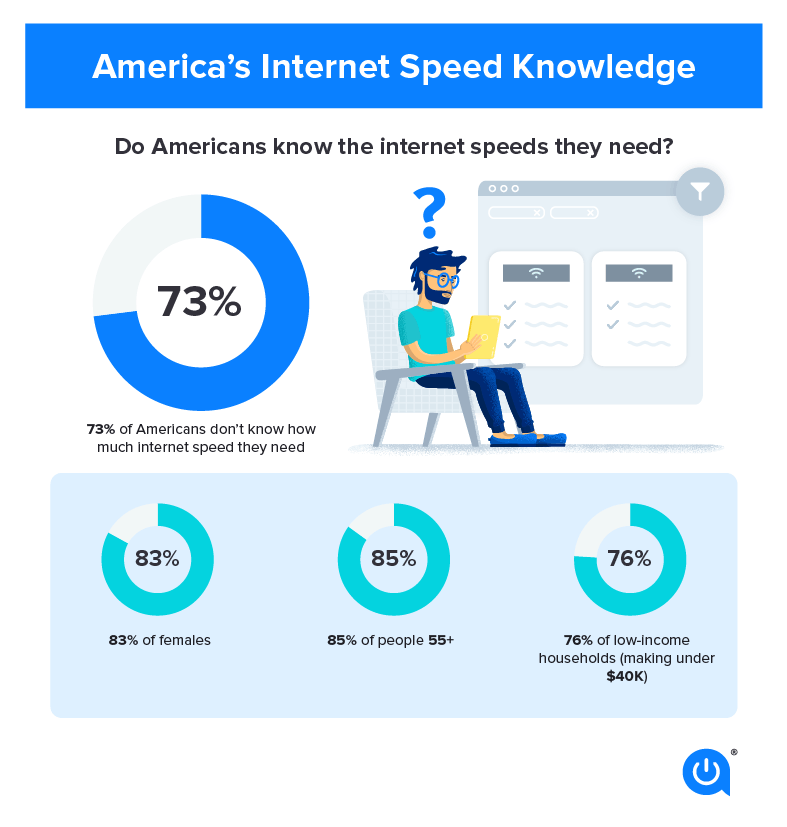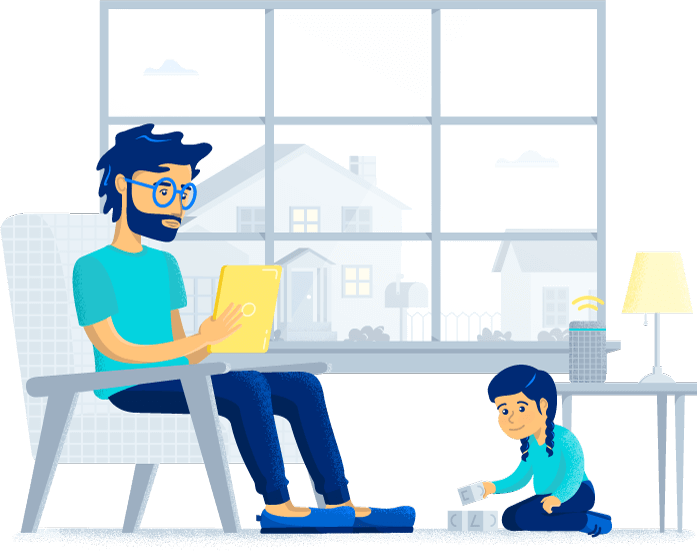Key findings
- 36% of Americans don’t know the internet speed they get to their house, but only 20% of those who didn’t know their speeds were dissatisfied with their service
- Women, people over the age of 55 and people who make under $40K were less likely to know their internet speed
- 66% of Americans are satisfied with their internet speed overall
- 73% of Americans don’t know how much internet speed they need
Our methodology
All figures, unless otherwise stated, are from a survey commissioned by Allconnect and conducted by the market research firm YouGov. The total sample size was 1,214 U.S. adults. Fieldwork was undertaken between May 14-17, 2021. The survey was carried out online. The figures have been weighed and are representative of all U.S. adults (aged 18+).
Americans spend around $720 every year on internet, but nearly 2 in 5 people say they don’t actually know what speeds they’re getting.
In a recent Allconnect survey on internet knowledge, we found that those who know more about their internet speeds were more likely to be men, younger and more highly paid — mirroring the digital divide trends we see across the country as whole.
Regardless of how much Americans know about their internet service, they tend to be satisfied with its performance overall. This was a surprising finding, considering that internet service providers are routinely one of the lowest rated industries for customer satisfaction. This leads us to believe that the problem is not with the broadband connections themselves, but the billing and customer service issues that come along with them.
36% of Americans don’t know their internet speed

Overall, 36% of Americans don’t know the internet speed they get in their homes. That might seem like a large number considering internet plans often top $100/mo., but it’s actually much lower than in recent years.
The percentage of Americans who do not know their speed “is down from 66% in 2015, and 77% in 2010,” according to Bruce Leichtman, the president and principal analyst of Leichtman Research Group, Inc., a firm that specializes in research and analysis of broadband and media industries.
“Men are significantly more likely to report that they know the speed of their service than are women,” said Leichtman. According to our survey, 47% of women didn’t know what internet speed they were getting, compared to just 25% of men.
![]()
While men may be more focused on the specific speed of the service than are women, ultimately all consumers tend to want a service that is reliable, fast enough to fit their online needs, and is a good value.
People over the age of 55 also fit into this category, with 45% reporting that they didn’t know their internet speed.
There was some correlation between income and internet knowledge, too, but it wasn’t quite as strong as age or gender. Around 36% of those making under $40K didn’t know their speed — the same rate as the country as a whole — but that number shrinks to only 30% for people making over $80K.
Most people are still satisfied with their speed
Overall, 30% of respondents said they “strongly agree” that they’re satisfied with the internet speed they’re getting, and 36% said they “somewhat agree.” On the other end, only 8% said they “strongly disagree” and 12% said “somewhat disagree.” This was a surprising result, considering around 15% of Americans receive slower speeds in practice than they’re paying for.
This trend held true even when respondents didn’t know what speed they were getting. 36% of Americans don’t know the internet speed they get to their house, but only 20% of them said they were dissatisfied with their service.
Of the 47% of women who didn’t know their internet speed, only 20% said they were dissatisfied with their service. Men, on the other hand, were more satisfied — only 19% said they’re dissatisfied with their speeds — and only 25% reported not knowing their speeds.
Similarly, those making under $40K also had a 20% dissatisfaction rate, despite 36% not knowing their speed.
The one group that was less happy with their service was people over the age of 55. The 45% of this group who didn’t know their internet speed had the largest dissatisfaction rate around speeds, with 23% unhappy with the speeds they receive.
Surprisingly, knowing your internet speed doesn’t necessarily mean you’re happier with it. “There is actually not a significant difference in satisfaction between those that report having internet service with download speeds over 50 Mbps, and those that don’t know their speed,” Leichtman told us. “However, those that report having internet speeds under 50 Mbps are significantly less satisfied than both other groups.”
Speed isn’t the issue for most people
For many people, these positive sentiments probably look a little too rosy. Aren’t internet service providers mostly known for long hold times and unexpected price hikes? While most people are actually pretty satisfied with the internet speed they’re getting, that doesn’t mean they’re happy with the process as a whole.
In the American Customer Satisfaction Index’s most recent update, internet service providers ranked dead last out of the 16 industries that received a score. Consumer Reports’ rankings tell a similar story: Almost every nationwide internet provider received low scores for value and technical support, while reliability and speed were typically scored higher.
So while the speeds that Americans receive are satisfactory for most people — good for 11th fastest in the world — the rest of the process leaves a lot to be desired. We pay about $6 more than Asia, $7 more than North America as a whole and $24 more than Europe, and the customer service experience is often frustrating.
73% of Americans don’t know how much internet speed they need

While a large percentage of people don’t know what speed they’re getting, twice as many don’t know how much internet speed they actually need. This group also heavily favored women: 83% of women said they didn’t know how much internet they need compared to only 62% of men. Additionally, 95% of women who don’t know their speeds don’t know what they need.
There was also a significant difference with younger men and women. 74% of women between 18 and 34 didn’t know what speed they need, compared to only 40% of men in the same age group.
Lower-income households were also slightly overrepresented in this category, with 76% of those making less than $40K saying they didn’t know what speed they need compared to 73% for the country as a whole.
Allconnect: Let us compare providers for you
Why should you choose Allconnect? We’re the #1 broadband marketplace in the U.S, meaning you can trust us to search, compare and order internet and TV service for your home.
Get started

Written by:
Joe SupanPrincipal Writer, Broadband Content
Joe is a senior writer for CNET covering home technology and broadband. Prior to joining CNET, Joe led MYMOVE’s moving coverage and reported on broadband policy, the digital divide, and privacy issues for the br…
Read more
Edited by:
Robin LaytonEditor, Broadband Content
-
Featured
![30% of Americans say their internet is too slow. Here’s how to fix it]() 30% of Americans say their internet is too slow. Here’s how to fix it Joe Supan — 4 min read
30% of Americans say their internet is too slow. Here’s how to fix it Joe Supan — 4 min read -
Featured
![Advertised vs. actual internet speeds — Are you getting the internet speeds you pay for?]() Advertised vs. actual internet speeds — Are you getting the internet speeds you pay for? Joe Supan — 5 min read
Advertised vs. actual internet speeds — Are you getting the internet speeds you pay for? Joe Supan — 5 min read -
Featured
![How much internet speed do I need?]() How much internet speed do I need? Robin Layton — 8 min read
How much internet speed do I need? Robin Layton — 8 min read
Latest
-
Wednesday, October 23, 2024
What is my IP address and why does it matter?Camryn Smith — 3 min read
-
Tuesday, October 22, 2024
Everything you need to know about internet speedsRobin Layton — 5 min read
-
Tuesday, October 22, 2024
How to change your Wi-Fi network passwordCamryn Smith — 3 min read






